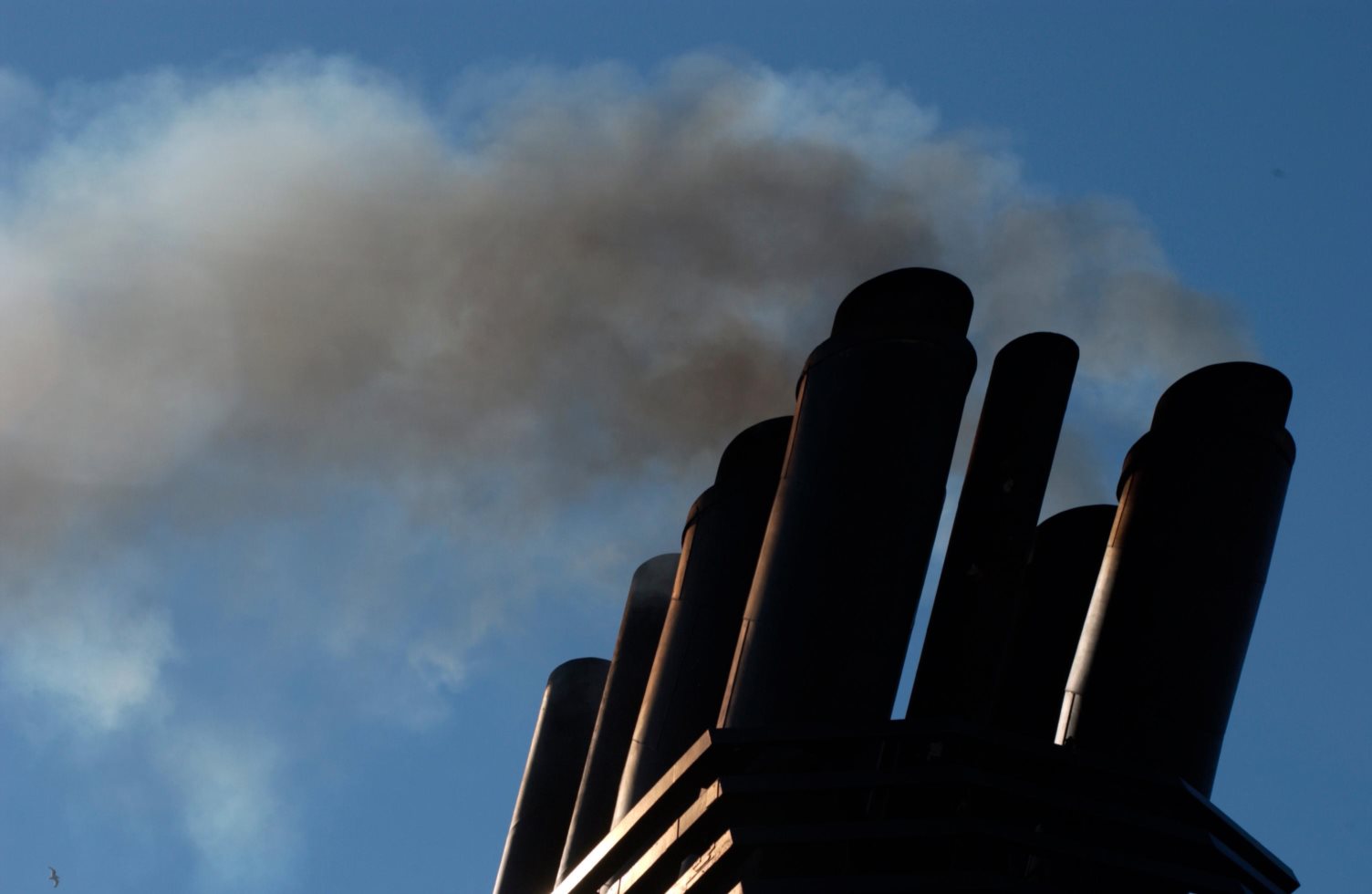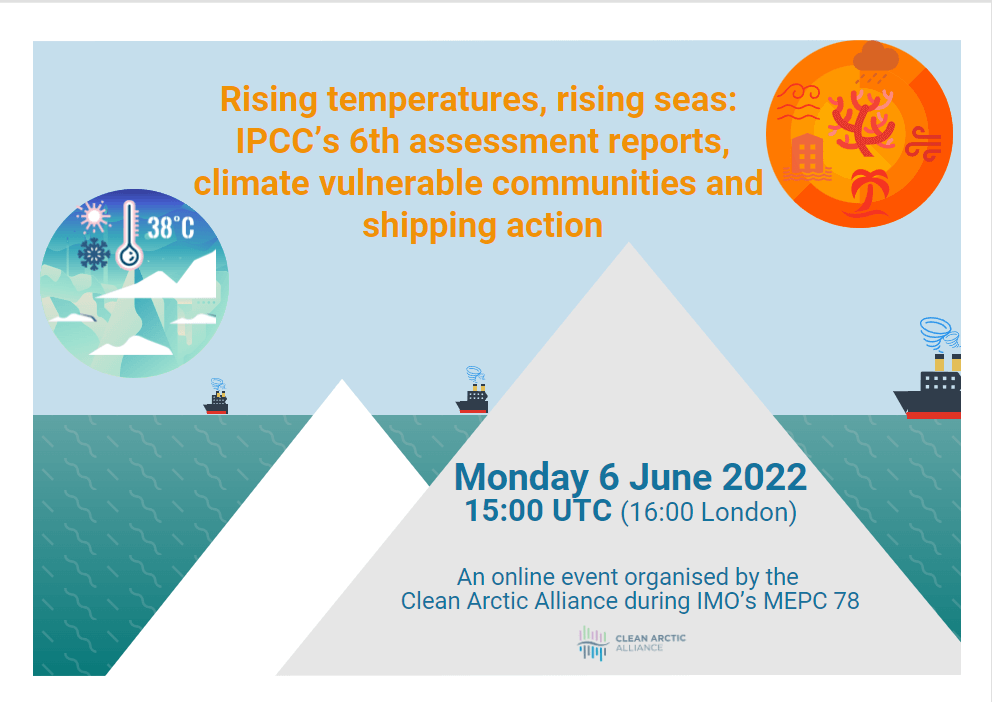
June 6th Webinar: Webinar: Rising temperatures, rising seas – IPCC’s 6th assessment reports, climate vulnerable communities and shipping action
London June 6th, 2022:- As a meeting of the International Maritime Organization’s Marine Environment Protection Committee (IMO, MEPC 78, June 6-10) opens today, the Clean Arctic Alliance called on the IMO to deliver urgent action to curb climate impacts on the Arctic, by delivering meaningful short-term measures that would kick-start dramatic reductions in global greenhouse gas and black carbon emissions from shipping this decade.
The IMO is set to address short-term measures to reduce GHG emissions, mid-term measures including strengthening the carbon intensity indicator for ships, and to start considering a, hopefully ambitious, revision of the IMO’s GHG strategy. In addition, a proposal for a new emission control area covering the Mediterranean waters, which if agreed will reduce SOx and black carbon emissions in the region, will be on the table for approval during MEPC 78 [1].
“The IMO must improve its levels of ambition in the recently agreed short-term carbon intensity reduction measures including a 1.5°Celcius -compatible improvement in the carbon intensity of ships, and revise its climate targets to ensure a 50% reduction in CO2e emissions by 2030, and full decarbonisation by 2040” , said Dr Sian Prior, Lead Advisor to the Clean Arctic Alliance, made up of 20 not-for-profit organisations [2]. “Only with concrete measures and immediate action to reduce emissions this decade do we have any hope of remaining below 1.5° Celsius heating globally, which is essential if we are to retain sea ice in the Arctic throughout the summer in the 2030s.”
“To avert the worst impacts on an already over-heating Arctic, the IMO must also make immediate cuts to black carbon emissions from shipping in and near the Arctic, as well as reducing the industry’s global emissions of black carbon. A switch to using distillate fuels in and near the Arctic would quickly reduce black carbon emissions by around 44% – practically overnight, while adding diesel particulate filters would reduce black carbon by over 90% – and that should be feasible before 2030” [3,4].
In April, following the release of the Intergovernmental Panel on Climate Change (IPCC) Working Group III 6th Assessment Report on Climate Mitigation, UN Secretary-General Antonio Guterres lambasted governments and industry for their climate inaction, while the IPCC’s report criticised the poor climate governance of international shipping [5], saying that “improvements to national and international governance structures would further enable the decarbonisation of shipping and aviation” [6,7].
“Climate scientists warn that we are already perilously close to tipping points that could lead to cascading and irreversible climate impacts. But, high‑emitting Governments and corporations are not just turning a blind eye, they are adding fuel to the flames”, said Guterres, during a speech to mark the publication of the Intergovernmental Panel on Climate Change (IPCC) Working Group III 6th Assessment Report on Climate Mitigation, on April 4th.
“Choices made by countries now will make or break the commitment to 1.5°C . A shift to renewables will mend our broken global energy mix and offer hope to millions of people suffering climate impacts today. Climate promises and plans must be turned into reality and action, now. It is time to stop burning our planet and start investing in the abundant renewable energy all around us”, said Guterres, on April 4th.
“As a United Nations agency, the IMO must face up to the realities facing our planet, by aligning its priorities with the UN on climate change, and usings its political power and the shipping industry’s vast technological resources to decarbonise the shipping sector”, concluded Prior.
NGOs MEPC 78 submission paper titles:
MEPC 78/7/27 IPCC AR6 Climate Change 2022: Mitigation of Climate Change
MEPC 78/7/18 Climate Change 2022: Impacts, Adaptation and Vulnerability
June 6th Webinar: Webinar: Rising temperatures, rising seas – IPCC’s 6th assessment reports, climate vulnerable communities and shipping action
As the International Maritime Organization’s MEPC 78 meeting opens on June 6, the Clean Arctic Alliance invites you to join us for a webinar exploring the recent IPCC Reports (Impacts, Adaptation and Vulnerability and Mitigation of Climate Change) and the consequences of climate change for communities in the Arctic and the South Pacific.
As MEPC 78 (Marine Environment Protection Committee) is set to consider action to reduce shipping’s contribution to the global climate crisis, IMO Members and the global shipping community must acknowledge the challenges faced and agree to ambitious targets backed by urgent and timely action to reach the Paris Agreement target to remain below 1.5oC, in order to protect people living on the frontline of our changing climate.
The event will feature a scientist involved in the IPCC reports, an Indigenous representative from the Inuit Circumpolar Council and a representative from the South Pacific.
The webinar and Q&A session will be moderated by the Clean Arctic Alliance.
Speakers:
- Pam Pearson – Director, International Cryosphere Climate Initiative (ICCI)
- Lisa Koperqualuk, Vice President – International Affairs, Inuit Circumpolar Council Canada
- Fe’iloakitau Kaho Tevi, Chief of Staff, Kingdom of Tonga Ministry of Foreign Affairs.
Moderator: Dr Sian Prior, Lead Advisor, Clean Arctic Alliance
ENDS
Contacts:
Dave Walsh, Clean Arctic Alliance Communications Advisor [email protected] +34 691 826 764
Notes: [1] IMO: MEPC 78 Preview, see “Tackling climate change – cutting GHG emissions from ships”
https://www.imo.org/en/MediaCentre/IMOMediaAccreditation/Pages/MEPC-78-preview-.aspx
[2] Zero-emission shipping and the Paris Agreement: Why the IMO needs to pick a zero date and set interim targets in its revised GHG strategy – Bryan Comer, International Council on Clean Transportation, September 2021https://theicct.org/zero-emission-shipping-and-the-paris-agreement-why-the-imo-needs-to-pick-a-zero-date-and-set-interim-targets-in-its-revised-ghg-strategy/
[3] International Council on Clean Transportation: The International Maritime Organization’s Proposed Arctic Heavy Fuel Oil Ban: Likely Impacts and Opportunities for Improvement, September 2020
https://theicct.org/sites/default/files/publications/Arctic-HFO-ban-sept2020.pdf
[4] Investigation of appropriate control measures (abatement technologies) to reduce Black Carbon Emissions from international shipping.
[5] April 4th, 2022: UN Secretary-General Warns of Climate Emergency, Calling Intergovernmental Panel’s Report ‘a File of Shame’, While Saying Leaders ‘Are Lying’, Fuelling Flames
https://www.un.org/press/en/2022/sgsm21228.doc.htm
Video: https://www.youtube.com/watch?v=FD2BGCA6x6Y
[6] April 4th, 2022: “Improvements to national and international governance structures would further enable the decarbonisation of shipping and aviation”, Summary for Policymakers IPCC AR6 WG III, C.8.4
https://report.ipcc.ch/ar6wg3/pdf/IPCC_AR6_WGIII_FinalDraft_FullReport.pdf
[7] April 7th, 2022: UN Shipping Body IMO Fails On Black Carbon, Lives Up To Reputation For Climate Inaction
About the Clean Arctic Alliance
Made up of 20 not-for-profit organisations, the Clean Arctic Alliance campaigns to persuade governments to take action to protect the Arctic, its wildlife and its people.
Members include: The Altai Project, Alaska Wilderness League, Bellona, Clean Air Task Force, Green Transition Denmark, Ecology and Development Foundation ECODES, Environmental Investigation Agency, Friends of the Earth US, Global Choices, Greenpeace, Iceland Nature Conservation Association, International Cryosphere Climate Initiative, Nature And Biodiversity Conservation Union, Ocean Conservancy, Pacific Environment, Seas At Risk, Surfrider Foundation Europe, Stand.Earth, Transport & Environment and WWF.
More more information visit https://www.cleanarctic.org/
Twitter: https://twitter.com/CleanArctic


